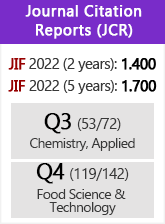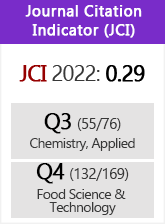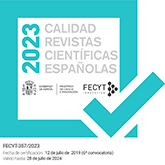A Mediterranean-style breakfast increases postprandial serum α-tocopherol levels in lean and obese individuals
DOI:
https://doi.org/10.3989/gya.1225172Keywords:
α-tocopherol, Breakfast, Mediterranean-style meal, Obesity, Postprandial, Western-style mealAbstract
The aim of this study was to compare the variations in the concentrations of tocopherols and retinol in obese adults in the postprandial state after the intake of a Mediterranean or Western-style breakfast. The study was designed as a randomized, controlled intervention trial in the postprandial state, for which 24 male adults (12 obese and 12 of normalweight) were recruited. After a fat challenge, blood samples were collected at different times postprandially and α-tocopherol, γ-tocopherol and retinol concentrations were determined in serum by HPLC. The Mediterranean-style meal produced a greater increase in serum α-tocopherol levels in both obese and normal-weight subjects, compared to the Western-style meal, indicating that the composition of the food affects the concentration of tocopherols in the postprandial state. However, the serum concentrations of γ-tocopherol and retinol remained unmodified. In conclusion, the presence of α-tocopherol in the meal could contribute to the protection of the Mediterranean-style meal against atherosclerosis in the postprandial state.
Downloads
References
Amigo-Benavent M, Sinausia L, Montero E, Perona JS. 2016. Discordant ability of the triglyceride to apolipoprotein B ratio to predict triglyceride-rich lipoprotein particle size in normal-weight and obese men. Exp. Biol. Med. 241, 1772–1775.
Armengol Lopez S, Botham KM, Lawson C. 2012. The oxidative state of chylomicron remnants influences their modulation of human monocyte activation. Int. J. Vasc. Med. 2012.
Ascherio A, Stampfer MJ, Colditz GA, Rimm EB, Litin L, Willett WC. 1992. Correlations of vitamin A and E intakes with the plasma concentrations of carotenoids and tocopherols among American men and women. J. Nutr. 122, 1792–1801. https://doi.org/10.1093/jn/122.9.1792
Bach-Faig A, Geleva D, Carrasco J, Ribas-Barba L, Serra- Majem L. 2006. Evaluating associations between Mediterranean diet adherence indexes and biomarkers of diet and disease. Public. Health Nutr. 9, 1110–1117.
Bates CJ, Mishra GD, Prentice A. 2004. ?-Tocopherol as a possible marker for nutrition-related risk: results from four National Diet and Nutrition Surveys in Britain. Br. J. Nutr. 92, 137.
Cabello-Moruno R, Perona JS, Ruiz-Gutierrez V. 2007. Influence of minor components of olive oils on the composition and size of TRLs and on macrophage receptors involved in foam cell formation. Biochem. Soc. Trans. 35, 470–471.
Cabello-Moruno R, Sinausia L, Botham KM, Montero E, Avella M, Perona JS. 2014. Postprandial phase time influences the uptake of TAG from postprandial TAG-rich lipoproteins by THP-1 macrophages. Br. J. Nutr. 112, 1469–1477.
Carnevale R, Pignatelli P, Nocella C, Loffredo L, Pastori D, Vicario T, Petruccioli A, Bartimoccia S, Violi F. 2014. Extra virgin olive oil blunt post-prandial oxidative stress via NOX2 down-regulation. Atherosclerosis. 235, 649–658.
Friedewald WT, Levy RI, Fredrickson DS. 1972. Estimation of the Concentration of Low-Density Lipoprotein Cholesterol in Plasma, Without Use of the Preparative Ultracentrifuge. Clin. Chem. 18, 499–502.
Fuhrman B, Volkova N, Rosenblat M, Aviram M. 2000. Lycopene Synergistically Inhibits LDL Oxidation in Combination with Vitamin E, Glabridin, Rosmarinic Acid, Carnosic Acid, or Garlic. Antioxidants & Redox Signaling 2, 491–506.
Godbout J, Berg BM, Kelley KW, Johnson RW. 2004. ?-Tocopherol reduces lipopolysaccharide-induced peroxide radical formation and interleukin-6 secretion in primary murine microglia and in brain. J. Neuroimmunol. 149, 101–109.
Guerci B, Vergès B, Durlach V, Hadjadj S, Drouin P, Paul JL. 2000. Relationship between altered postprandial lipemia and insulin resistance in normolipidemic and normoglucose tolerant obese patients. Int. J. Obes. Relat. Metab. Disord. 24, 468–478.
Hak AE, Stampfer MJ, Campos H, Sesso HD, Gaziano JM, Willett W, Ma J. 2003. Plasma carotenoids and tocopherols and risk of myocardial infarction in a low-risk population of US male physicians. Circulation 108, 802–807.
Hoydonck PGA van, Schouten EG, Manuel-y-Keenoy B, Campenhout A van, Hoppenbrouwers KPM, Temme EHM. 2004. Does vitamin C supplementation influence the levels of circulating oxidized LDL, sICAM-1, sVCAM-1 and vWF-antigen in healthy male smokers? Eur. J. Clin. Nutr. 58, 1587–1593.
Mah E, Noh SK, Ballard KD, Park HJ, Volek JS, Bruno RS. 2013. Supplementation of a ?-tocopherol-rich mixture of tocopherols in healthy men protects against vascular endothelial dysfunction induced by postprandial hyperglycemia. J. Nutr. Biochem. 24, 196–203.
Majerczyk M, Olszanecka-glinianowicz M, Puzianowska- M, Chudek J. 2016. Retinol-binding protein 4 (RBP4) as the causative factor and marker of vascular injury related to insulin resistance. Postepy. Hig. Med. Dosw. 70, 1267–1275.
Manuel-Y-Keenoy B, Campenhout A van, Vertommen J, Gaal L van, De Leeuw I. 2004. Evolution of serum ?-tocopherol in the postprandial and postabsorptive phases in type 1 diabetes mellitus. Ann. N. Y. Acad. Sci. 1031, 439–442. https://doi.org/10.1196/annals.1331.067 https://doi.org/10.1196/annals.1331.067
Maruyama C, Kikuchi N, Masuya Y, Hirota S, Araki R, Maruyama T. 2013. Effects of green-leafy vegetable intake on postprandial glycemic and lipidemic responses and ?-tocopherol concentration in normal weight and obese men. J. Nutr. Sci. Vitaminol. 59, 264–271.
Mody N. 2017. Alterations in vitamin A/retinoic acid homeostasis in diet-induced obesity and insulin resistance. Proc. Nutr. Soc. 76, 597–602.
Nielsen NS, Marckmann P, Høy C. 2000. Effect of meal fat quality on oxidation resistance of postprandial VLDL and LDL particles and plasma triacylglycerol level. Br. J. Nutr. 84, 855–863.
Plotnick GD, Corretti MC, Vogel RA. 1997. Effect of Antioxidant Vitamins on the Transient Impairment of Endothelium—Dependent Brachial Artery Vasoactivity Following a Single High-Fat Meal. JAMA J. Am. Med. Assoc. 278, 1682–1686.
Spanish Agency for Consumer Affairs, Food Safety and Nutrition A. Spanish database of food composition. http:// www.bedca.net/bdpub/index.php. Accessed 11-29-2017.
Teupser D, Thiery J, Seidel D. 1999. Alpha-tocopherol down-regulates scavenger receptor activity in macrophages. Atherosclerosis 144, 109–115.
Traber MG, Leonard SW, Bobe G, Fu X, Saltzman E, Grusak MA, Booth SL. 2015. ?-tocopherol disappearance rates from plasma depend on lipid concentrations: Studies using deuterium-labeled collard greens in younger and older adults. Am. J. Clin. Nutr. 101, 752–759.
Traber MG, Mah E, Leonard SW, Bobe G, Bruno RS. 2017. Metabolic syndrome increases dietary alpha-tocopherol requirements as assessed using urinary and plasma vitamin E catabolites: a double-blind, crossover clinical trial. Am. J. Clin. Nutr. 105, 571–579.
Trpkovic A, Resanovic I, Stanimirovic J, Radak D, Mousa SA, Cenic-Milosevic D, Jevremovic D, Isenovic ER. 2015. Oxidized low-density lipoprotein as a biomarker of cardiovascular diseases. Crit. Rev. Clin. Lab. Sci. 52, 70–85.
Uzun A, Yener U, Cicek OF, Yener O, Yalcinkaya A, Diken A, Ozkan T, Turkvatan A, Ulas M. 2013. Does vitamin C or its combination with vitamin E improve radial artery endothelium-dependent vasodilatation in patients awaiting coronary artery bypass surgery? Cardiovasc. J. Afr. 24, 255–259. https://doi.org/10.5830/CVJA-2013-046
Published
How to Cite
Issue
Section
License
Copyright (c) 2018 Consejo Superior de Investigaciones Científicas (CSIC)

This work is licensed under a Creative Commons Attribution 4.0 International License.
© CSIC. Manuscripts published in both the printed and online versions of this Journal are the property of Consejo Superior de Investigaciones Científicas, and quoting this source is a requirement for any partial or full reproduction.All contents of this electronic edition, except where otherwise noted, are distributed under a “Creative Commons Attribution 4.0 International” (CC BY 4.0) License. You may read here the basic information and the legal text of the license. The indication of the CC BY 4.0 License must be expressly stated in this way when necessary.
Self-archiving in repositories, personal webpages or similar, of any version other than the published by the Editor, is not allowed.
















